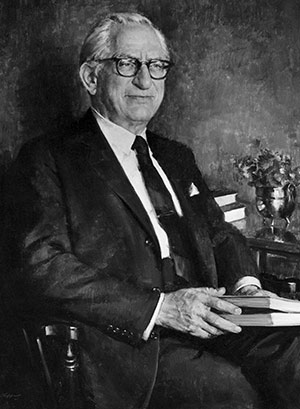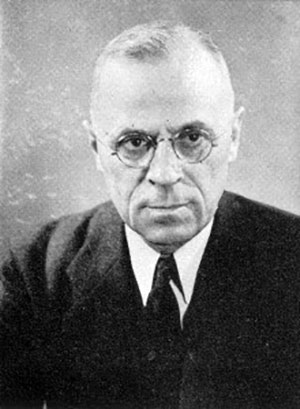
Jerome Hall
Law professor Jerome Hall was an early advocate for the use of scientific methods to understand the practice of law. Author of “Theft, Law, and Society,” he is known for his groundbreaking empirical analyses of law.
From the beginning, the Department of Criminology and Criminal Justice has been committed to integrating law and the social sciences with the study of justice. Our rich history reflects this continuing mission of engaging multiple disciplines to better understand both the nature of crime and society’s responses to violence and injustice.
Our history was shaped by two pioneers in the field of criminal justice.

Law professor Jerome Hall was an early advocate for the use of scientific methods to understand the practice of law. Author of “Theft, Law, and Society,” he is known for his groundbreaking empirical analyses of law.

Sociologist Edwin H. Sutherland defined the notion of white-collar crime. He is widely regarded as one of the most influential criminologists of the 20th century, and his work continues to shape many areas of the field.
Today, the Department of Criminology and Criminal Justice continues to embrace its liberal arts mission.
Faculty members are recognized for moving their inquiry beyond the study of law and formal justice systems toward research into the many forms of violence in personal relationships, institutions, and broader society.
Bridging the gaps between law and the social sciences, students explore the administration of criminal and civil justice systems, the nature of crime and deviance, the relationship between law and its social context, and the impact and importance of cross-cultural inquiry within the field.
We are a diverse group, but each one of us is committed to reshaping, challenging, and furthering our understanding of crime and justice.
Meet our facultyJUNE 15, 1935
The Board of Trustees established the Institute of Criminal Law and Criminology at Indiana University Bloomington.
1945
The Institute’s rapid growth led the university to transform it into a department, known first as the Department of Police Administration.
1946
From the beginning, the department offered a four-year BA degree in the College of Arts and Sciences. It was the first criminal justice program in the country to recognize the importance of college-level police work training in the context of the liberal arts.
1958
Robert F. Borkenstein, inventor of the Breathalyzer, joined the university with the vision of moving beyond a police training curriculum to one of discussing crime causation from an interdisciplinary perspective.
1971
The department name was changed to the Department of Forensics Studies to reflect the work of Robert Borkenstein. Dr. J. Erroll Miller was appointed as the first Chair and led the department until 1979, expanding its focus from policing to the entire criminal justice system.
1970 + 80s
The department attracted top scholars trained in various disciplines during this time, including Hal Pepinsky (sociology, law), Cathy Spatz Widom (psychology), Ellen Dwyer (history), Phil Parnell (anthropology), and Mary Lee Luskin (political science). New faculty members developed innovative courses to complement core courses in forensic and policing science.
1985
In 1985, the department acquired its present name, more accurately reflecting the breadth of its intellectual and interdisciplinary reach.
1985
Coramae Richey Mann was recruited to help establish a doctoral program. Mann was a major intellectual figure in the study of race, gender, and inequality. Her appointment attracted other prominent faculty, helping to ensure the department’s reputation as a leading center of research relating to racism in the criminal justice system.
1997
The Ph.D. program launched in 1997. By this time the faculty included experts in criminal justice, sociology, psychology, law, demography, anthropology, philosophy, and economic theory.
2002
The first Ph.D. in Criminal Justice was awarded to Natalie Kroovand Hipple.
2024
2024